Leadership
Colonel Tanja C. Roy, SP, Commander
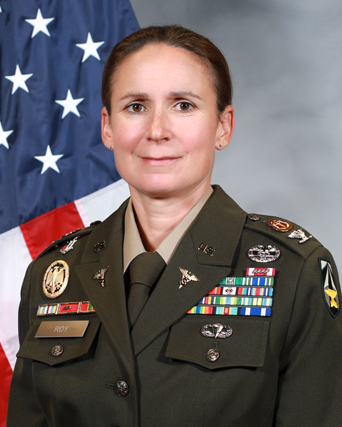
Colonel Tanja C. Roy grew up in Massachusetts and is an avid New England Sports fan. She received her commission from the University of Notre Dame Reserve Officer Training Corps as a Distinguished Military Graduate in 2000 into the Army Medical Specialist Corps. COL Roy holds a Doctor of Philosophy degree from the University of Pittsburgh, Doctor of Physical Therapy from Baylor University, Master of Science from the University of Pittsburgh, Master of Physical Therapy from Baylor University, and Master of Strategic Studies from the U.S. Army War College.
She recently served as the Director of Occupational Health Sciences at the Defense Centers for Public Health - Aberdeen (DCPH-A). Previously, COL Roy created and served as Director of the Soldier Performance, Health, and Readiness Database at the U.S. Army Research Institute of Environmental Medicine (USARIEM). Previous assignments include executive officer for the Clinical Public Health and Epidemiology Directorate, Army Public Health Center; Physical Therapy Researcher, University of Pittsburgh School of Health and Rehabilitation Sciences and the Graduate School of Public Health; Physical Therapy Researcher at USARIEM; Chief, Physical Therapy Troop Medical Clinic, Fort Drum; Chief, Physical Therapy, 3rd Infantry Brigade Combat Team, Fort Drum and Afghanistan; Assistant Chief, Baumholder Physical Therapy Clinic; Chief, Physical Therapy, 701st Main Support Battalion, 1st Infantry Division, Iraq; Physical Therapist, 31st Combat Support Hospital, Iraq; Chief, Baumholder Physical Therapy Clinic; and Physical Therapist, Landstuhl Regional Medical Center. She has 29 medical research publications.
COL Roy is a graduate of the U.S. Army Medical Department (AMEDD) Officer Basic Course, the AMEDD Captains Career Course, Intermediate Level Education, the Defense Strategy Course, and U.S. Army War College. She is Airborne Qualified (5P); a Strategic Studies Graduate (6Z); an Army Medical Department Acquisitions Officer (8X); a certified Medical Research, Development, Testing, and Evaluation Officer (8Z); and holds the Medical Proficiency Designator (9A).
Her awards and decorations include the Meritorious Service Medal (4 oakleaf clusters), Army Commendation Medal (2 oakleaf clusters), Army Achievement Medal, Afghanistan Campaign Medal, Global War on Terrorism Expeditionary Medal and Soldier Medal, Military Outstanding Volunteer Medal, Humanitarian Service Medal, Overseas Service Medal (1 oakleaf cluster), Joint Meritorious Unit Award, Army Superior Unit Award (3 oakleaf clusters), Meritorious Unit Award (1 oakleaf cluster), Parachutist Badge, German Sports Badge (Gold), and Combat Medic Badge. She is a member of the Order of Military Medical Merit.
MSG Wanda C. Lewis, Senior Enlisted Leader
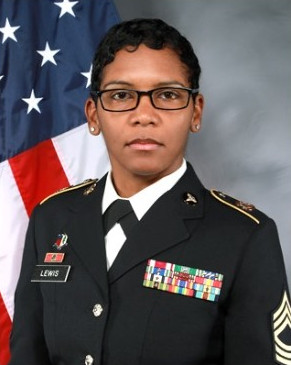
Master Sergeant Wanda C. Lewis is a native of the Dominican Republic, she enlisted in the Army in 2006 and attended Basic Combat Training at Fort Jackson, South Carolina and completed Advance Individual Training at Fort Lee, Virginia as a Water Treatment Specialist (92W), commonly known in the Army as “Waterdawgs.”
MSG Lewis’ assignments includes Headquarter and Headquarters Company First Sergeant at the United States Army Institute of Surgical Research, Joint Base San Antonio, Texas; Professional Development NCO/Assignment Manager at the Enlisted Personnel Management Directorate, Human Resources Command, Fort Knox, Kentucky; Senior Enlisted Aide for the Hospital Commander, Tripler Army Medical Center, Hawaii; Drill Sergeant Leader at the Drill Sergeant Academy and Drill Sergeant at Echo Company 3BN 34TH INF DIV, Fort Jackson, South Carolina; Walter Reed Army Medical Center Transfusion Services NCOIC, Washington, District of Columbia; Human Resources Specialist, HHC 3rd CMT SPT BN at Fort Stewart, Georgia; Water Treatment Specialist at 512th QM CO Hunter Army Airfield, Georgia. She served on a Deployment to Iraq.
MSG Lewis’s military and civilian education includes: Basic Leaders Course; Advance Leaders Course; Senior Leaders Course; Master Leaders Course; Sexual Harassment/ Assault Prevention Course, Equal Opportunity Leader Course, Master Fitness Trainer Course, Level 1-2 Master Resiliency Training Courses, Antiterrorism Officer Basic and Advance Courses, Battle Staff Course, Ask Care and Escort Suicide Intervention (ACE-SI) Tier II Course, Company Commander and First Sergeant Course, Counter-Improvised Explosive Device Train the Trainer Course, Drill Sergeant School Course, Facilitator Course, Combative Level I Course, and Drill Sergeant Leader Certification. She is currently pursuing her bachelor’s degree on Medical Laboratory Science from the Thomas Edison State University.
MSG Lewis’s awards include the Meritorious Service Medal (2OLC), Army Commendation Medal (1 SLC), Army Achievement Medal (4SLC, 2OLC), Good Conduct Medal (6th award), National Defense Service Medal, Iraq Campaign Medal (one bronze service star), Global War on Terrorism Service Medal, Army Service Ribbon, Overseas Service Ribbon (2nd award), Military Outstanding Volunteer Service Medal (3 bronze service star), Army Superior Unit Award (1OLC), Drill Sergeant Badge, Basic Instructor Badge, Driver and Mechanic Badge. She is a member of the Distinguished Sergeant Audie Murphy Club.
COL Kevin Doherty, Deputy Commander
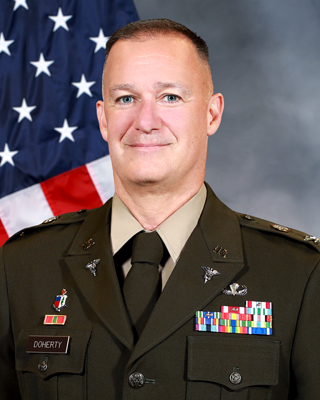
COL Kevin Doherty is a native of Boston, MA. His education includes a Bachelor of Science (B.S.) degree in Forensic Science and a Doctor of Philosophy (Ph.D.) degree in Biochemistry. Following his Ph.D., he completed a postdoctoral fellowship, with a focus on accelerated aging disorders, at the National Institutes of Health (NIH). His research has resulted in 16 publications (peer reviewed scientific journals and a book chapter).
He enlisted in the Army as a Signals Intelligence Analyst. He received his commission as a Medical Service Corps Officer as a Biochemist (71B) through a direct commission. He is a graduate of the Army Medical Department (AMEDD) Officer Basic Course, the AMEDD Captains Career Course, Airborne School, and the Command and General Staff College.
COL Doherty currently serves Deputy Commander for U.S. Army Medical Research Institute of Chemical Defense, Aberdeen Proving Ground (APG), MD. His previous assignments include Assistant Deputy Commander for Clinical Services at Dwight D. Eisenhower Army Medical Center (DDEAMC) at Ft. Eisenhower, GA.; Deputy Branch Chief of the Medical Corps Branch, Human Resources Command; Career Manager for Allied Health Science Officers, Human Resources Command; Ft. Knox, KY.; Laboratory Manager, Army Public Health Center, APG, MD.; Chemical and Biological Systems Officer, Defense Intelligence Agency (DIA), Charlottesville, VA.; Intelligence Laboratory Manager, Camp Leatherneck Helmand Province, Afghanistan; OIC Chemical Threat Assessment Section, 9th Area Medical Laboratory (9th AML), APG, MD.; Principal Investigator, Armed Forces Radiobiology Research Institute, Bethesda, MD.; Intelligence Analyst, 1st Special Forces Group, JBLM, WA.
His military awards and decorations include the Defense Meritorious Service Medal (OLC), the Meritorious Service Medal (3 OLC), the Joint Service Commendation Medal, the Army Achievement Medal (2 OLC), Army Superior Unit Award, the Humanitarian Service Medal, the National Defense Service Medal, Global War on Terror Service Medal, Afghanistan Campaign Medal, Korean Defense Service Medal, North Atlantic Treaty Organization (NATO) Medal, the Armed Forces Service Medal, OEF Campaign Medal, and the Parachutist Badge. He was awarded The Army Medical Department “A” Proficiency Designator Award for Professional Excellence and is a member of the Order of Military Medical Merit (O2M3). Key civilian awards include the Joseph Schor Award for Advancement of Biomedical Research, the Outstanding Intern Award New York City Police Department, and the Fellows Award for Research Excellence, NIH.
COL Doherty's operational deployments include Operation Tomodachi in Japan in 2011, providing disaster relief in the aftermath of the tsunami and nuclear reactor disasters that followed, with the 9th Area Medical Laboratory (9th AML). COL Doherty deployed to Helmand Province Afghanistan in support of Operation Enduring Freedom as part of the Joint Special Operations Task Force (JSOTF) in 2013.
Carter C. Bender, Chief of Staff
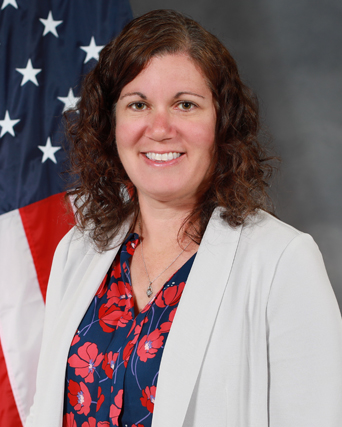
Ms. Carter C. Bender currently serves as the Chief of Staff at the United States Army Medical Research Institute of Chemical Defense. As such, she oversees the staff functions and provides executive leadership to managers for support services.
Ms. Bender began her federal career in 2005 as an Operations Research Analyst at the United States Army Test and Evaluation Command, where she managed and supervised Information Assurance Task Force assessment teams during major Combatant Command training exercises. Ms. Bender joined the United States Army Medical Research Institute of Chemical Defense as a facilities engineer in 2010 and subsequently became the Chief of Facilities at the Institute.
Ms. Bender received a B.S. in mechanical engineering from the University of Maryland, College Park, and an M.S. in management from the University of Maryland, University College.
Shane A. Kasten, Ph.D., Director of Research
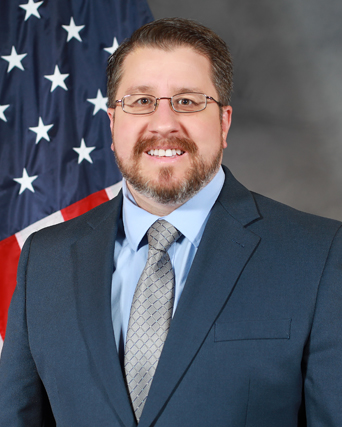
Dr. Shane A. Kasten is currently the Director of Research at the United States Army Medical Research Institute of Chemical Defense. He serves as Chief Scientist and manages the programmatic and scientific enterprise focused on the research and development of medical countermeasures against chemical and biochemical threats to protect Warfighters as well as Civilians. He serves as a Command advisor and oversees the activities of the Medical Toxicology Research Division, Research Support Division, and the Research Development and Integration Office.
He served previously as a Principal Investigator in the Biochemistry and Physiology Department at the United States Army Medical Research Institute of Chemical Defense. As a Principal Investigator, Dr. Kasten directed a research group focused on basic and applied research endeavors to develop medical countermeasures to chemical warfare agents. His initial research concentrated on the development and evaluation of candidate enzymes specifically targeted at detoxifying nerve agents in the blood stream of an exposed individual. Later, Dr. Kasten led the development of the ChemDx (aka ChemKast) medical diagnostic device for far-forward fielding on the austere battlefield. He ended is research career with the initial development of a skin disclosure spray prototype, coined SkinKast, designed to rapidly detect and guide stringent decontamination following dermal exposure to a chemical warfare agent.
Dr. Shane A. Kasten received a B.S. and Ph.D. in Biochemistry from Kansas State University. He completed a postdoctoral fellowship at the Massey Cancer Center, Virginia Commonwealth University in the department of Cellular Biology and Toxicology. A second postdoctoral fellowship was completed at the U.S. Army Medical Research Institute of Chemical Defense as an Oak Ridge Institute for Science and Education participant before taking a position on staff as a Principal Investigator in the Physiology and Immunology Branch at the United States Army Medical Research Institute of Chemical Defense.
 An official website of the United States government
An official website of the United States government
 ) or https:// means you've safely connected to the .mil website. Share sensitive information only on official, secure websites.
) or https:// means you've safely connected to the .mil website. Share sensitive information only on official, secure websites.


